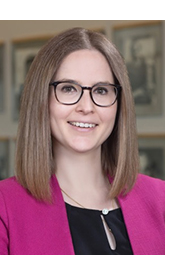TEAM INCLUDING DICKINSON LAW PROF. SARA GERKE RECEIVES €6 MILLION EU GRANT TO RESEARCH AI AND CANCER SURGERY
June 2022 — Once designated to the realm of science fiction, artificial intelligence (AI) has become an increasing reality in everyday life. Early applications on website messenger platforms and video games have given way to more impactful opportunities, such as AI-assisted surgery, and the potential upsides could save lives.
 But what are the legal and ethical issues arising from AI-assisted surgery? And how do we navigate those potential pitfalls? A new project dubbed CLASSICA, which includes Penn State Dickinson Law Assistant Professor of Law Sara Gerke, aims to explore those concerns.
But what are the legal and ethical issues arising from AI-assisted surgery? And how do we navigate those potential pitfalls? A new project dubbed CLASSICA, which includes Penn State Dickinson Law Assistant Professor of Law Sara Gerke, aims to explore those concerns.
CLASSICA recently won a €6 million grant from Horizon Europe, the European Union’s funding program for research and innovation, to deliver and clinically validate an AI-based clinical decision support system, which rapidly identifies cancerous tumors and maps their distribution.
Ronan Cahill, Professor of Surgery at University College Dublin and Dublin’s Mater Misericordiae University Hospital, will lead the four-year project with eleven partners from nine different countries. Clinical validation of the AI technology will take place across five leading European cancer centers, building on breakthrough research conducted over the past three years at the Mater Hospital.
Gerke will spearhead, as co-principal investigator, the study of the legal and ethical implications raised by AI-assisted surgery, along with Timo Minssen, Professor of Law at the University of Copenhagen (UCPH) and the founding director of UCPH’s Center for Advanced Studies in Biomedical Innovation Law. The team in Copenhagen will focus on the regulatory landscape and bias, and Gerke and her team will focus on liability. The teams will also collaborate on these issues.
Gerke, an expert in health law, bioethics, and liability, noted that intensive research like this will propel the ethical and legal field of health AI forward over the next years.
“Even if you have a perfect AI tool, itself a feat, that does not mean you can easily implement it into practice. We have a lot to investigate,” said Gerke. “Under current laws, who is likely to be held liable and who should be held liable if an AI-assisted operation goes wrong? Is it the surgeons, the hospital, and/or the AI developer? What are other concerns for the surgeons?”
CLASSICA’s AI-based technology will assist surgeons in real time during operations by accurately identifying cancerous versus healthy tissue. Following the administration of a safe fluorescent dye, a smart camera captures the color changes in tissue. The AI processes video from the camera, helping the surgeon define the extent of the excision. The hope is that the added AI support, combined with the surgeon’s judgment and expertise, will decrease post-surgery complications and reduce patients’ risk of cancer recurrence.
Dickinson Law takes a leading role
Gerke was thrilled to learn about the grant’s awarding. Horizon Europe is one of the most prestigious funding programs in Europe, and the chance of receiving the grant was less than 10 percent.
“Professor Gerke’s involvement in this project opens up many excellent opportunities for Dickinson Law,” said Danielle M. Conway, who is the Dean and Donald J. Farage Professor of Law at Penn State Dickinson Law. Gerke has already hired three student fellows from the Law School’s Class of 2024—Connor K. Judge, Kaci McNeave, and Robin Platte—to assist with her research. She has funding to hire a full-time post-doctoral research fellow as well.
As part of the project, Dickinson Law will co-organize a conference in Copenhagen. Gerke said the conference will occur in the third year of CLASSICA, and she plans to invite surgeons and other stakeholders in AI from around the world.
To begin their research, Gerke and her team will explore the topic of liability in AI-assisted surgery from a comparative legal perspective (the U.S. and Europe). Part of the work will also involve conducting a focus group with surgeons to discover concerns they have about using AI tools in real-time surgery.
She said exploring bias issues, data privacy, and medical device regulation will all fall within the scope of the work. Surgeons also have questions about the implications of using AI from a cost perspective. Throughout the project, Gerke and her team plan to work closely together with the team in Copenhagen and other CLASSICA partners.
Gerke and Minssen have worked together on previous projects, and she noted that the international move to virtual working over the past two years has made global collaboration much easier. She says the entire project cohort plans to meet in person at least twice a year, and she and her research fellow will spend a portion of the next few summers in Copenhagen conducting research.
Gerke is excited to tackle the project, which she believes could help pave the way for wider deployment of AI in hospitals, and watch how her students benefit, too. “Throughout the project, they will have the chance to write, and maybe publish, too. Just being involved in this interdisciplinary research is an excellent opportunity for the students,” said Gerke.
For more information on CLASSICA, please visit https://classicaproject.eu/ or, for regular updates, follow CLASSICA on Twitter @classicaproject. Applications for the research fellow position are now being considered. To see the job listing and apply, click here.

Funded by the European Union. Views and opinions expressed are however those of the author(s) only and do not necessarily reflect those of the European Union or the Health and Digital Executive Agency. Neither the European Union nor the granting authority can be held responsible for them.